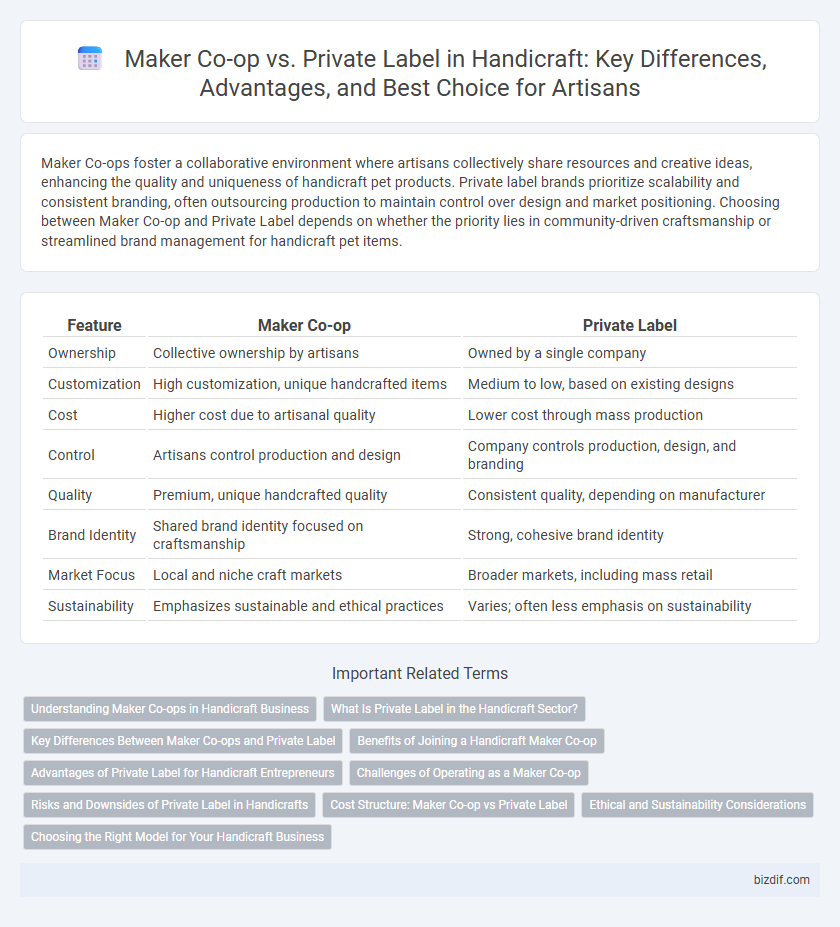Maker Co-ops foster a collaborative environment where artisans collectively share resources and creative ideas, enhancing the quality and uniqueness of handicraft pet products. Private label brands prioritize scalability and consistent branding, often outsourcing production to maintain control over design and market positioning. Choosing between Maker Co-op and Private Label depends on whether the priority lies in community-driven craftsmanship or streamlined brand management for handicraft pet items.
Table of Comparison
| Feature | Maker Co-op | Private Label |
|---|---|---|
| Ownership | Collective ownership by artisans | Owned by a single company |
| Customization | High customization, unique handcrafted items | Medium to low, based on existing designs |
| Cost | Higher cost due to artisanal quality | Lower cost through mass production |
| Control | Artisans control production and design | Company controls production, design, and branding |
| Quality | Premium, unique handcrafted quality | Consistent quality, depending on manufacturer |
| Brand Identity | Shared brand identity focused on craftsmanship | Strong, cohesive brand identity |
| Market Focus | Local and niche craft markets | Broader markets, including mass retail |
| Sustainability | Emphasizes sustainable and ethical practices | Varies; often less emphasis on sustainability |
Understanding Maker Co-ops in Handicraft Business
Maker co-ops in the handicraft business empower artisans by pooling resources, shared expertise, and collective branding to enhance market reach and reduce individual costs. Unlike private labels, which often outsource production and control branding centrally, maker co-ops prioritize community-driven creation and decision-making, fostering authenticity and sustainable practices. This collaborative model strengthens local economies and preserves traditional craftsmanship through mutual support and direct consumer engagement.
What Is Private Label in the Handicraft Sector?
Private label in the handicraft sector refers to handmade products created by artisans or small-scale makers but branded and sold under a retailer's or company's name. This practice allows businesses to offer unique, handcrafted items without managing the production process directly, ensuring product quality while focusing on marketing and distribution. Private labeling supports scalability for makers and provides retailers with exclusive product lines tailored to their customer base.
Key Differences Between Maker Co-ops and Private Label
Maker co-ops emphasize collective ownership, where artisans collaborate to share resources, decision-making, and profits, fostering community and transparency. Private label involves manufacturers producing goods under a retailer's brand, prioritizing control over branding and consistent product standards, often at the expense of individual maker recognition. Key differences include ownership structure, branding control, and the balance between artisan autonomy versus centralized management in product creation.
Benefits of Joining a Handicraft Maker Co-op
Joining a handicraft maker co-op offers artisans collective bargaining power, access to shared resources, and increased market exposure, leading to higher sales and reduced costs. Members benefit from collaborative marketing strategies, skill-sharing workshops, and a supportive community that fosters creativity and innovation. Unlike private label arrangements, co-ops maintain individual brand identity while leveraging collective strengths for sustainable growth.
Advantages of Private Label for Handicraft Entrepreneurs
Private label offers handicraft entrepreneurs greater control over branding, allowing them to create unique product identities that resonate with target customers. It enables higher profit margins by eliminating intermediaries, ensuring direct market access and pricing flexibility. Customization options through private labeling also support product differentiation, enhancing competitive advantage in niche markets.
Challenges of Operating as a Maker Co-op
Operating as a maker co-op involves navigating collective decision-making processes that can slow down strategic actions and limit quick market responses. Coordinating production schedules and quality standards among diverse artisan members presents significant logistical challenges, often leading to inconsistent product supply. Furthermore, securing funding and managing shared resources within a cooperative framework complicates scalability compared to private label businesses with centralized control.
Risks and Downsides of Private Label in Handicrafts
Private label in handicrafts carries risks such as quality control challenges and limited brand identity, which can undermine customer loyalty and long-term growth. Dependence on external manufacturers increases vulnerability to supply chain disruptions and inconsistent product standards. Furthermore, private label businesses often face lower profit margins compared to maker co-ops due to higher production costs and lack of direct involvement in the crafting process.
Cost Structure: Maker Co-op vs Private Label
Maker co-ops often benefit from shared production costs and collective purchasing power, resulting in lower raw material and overhead expenses compared to private label operations. Private label businesses typically face higher fixed costs due to individual marketing, branding, and inventory management responsibilities, which increase the overall cost structure. These differences make maker co-ops more cost-efficient in scaling production while private labels invest more heavily in brand differentiation and customer acquisition.
Ethical and Sustainability Considerations
Maker Co-ops prioritize ethical production by fostering fair wages, transparent supply chains, and community empowerment, which significantly reduce environmental impact through sustainable sourcing and eco-friendly materials. Private label models often face challenges in maintaining consistent ethical standards, as outsourcing can lead to less oversight and potential exploitation of labor and resources. Emphasizing local craftsmanship and renewable materials, maker co-ops contribute to a circular economy while many private label products rely on mass production with higher carbon footprints and questionable labor practices.
Choosing the Right Model for Your Handicraft Business
Selecting the right business model for your handicraft venture hinges on understanding Maker Co-op and Private Label differences. Maker Co-ops emphasize collective creativity, shared resources, and community engagement, making them ideal for artisans seeking collaborative growth and ethical practices. Private Label offers full control over branding and product design, suitable for entrepreneurs aiming for unique market positioning and higher profit margins.
Maker Co-op vs Private Label Infographic

 bizdif.com
bizdif.com